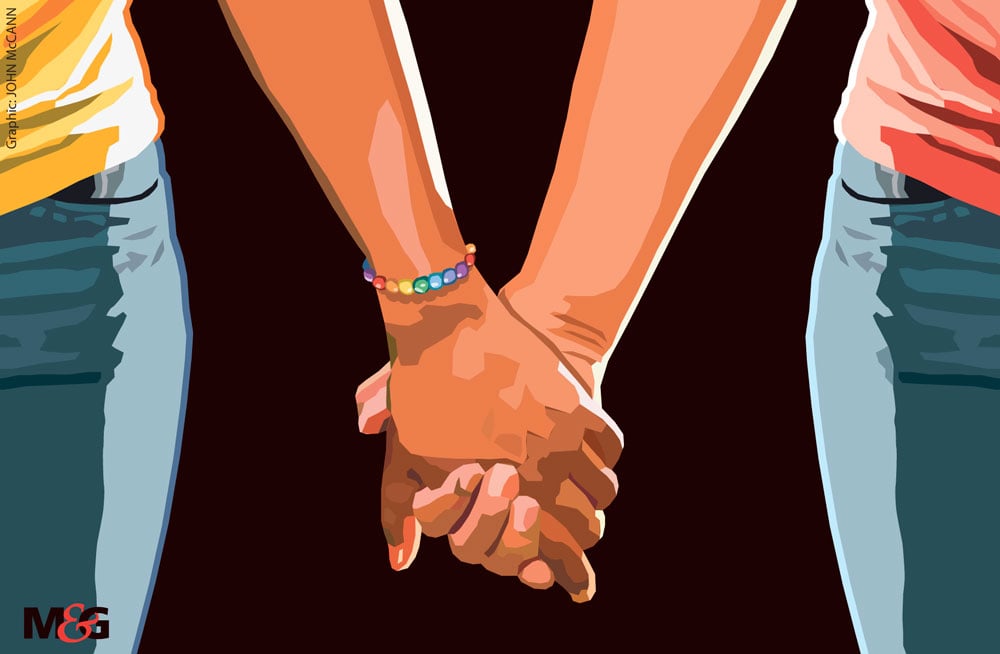Too many women continue to believe that domestic partnerships or cohabitation is recognised in our common law and that a “common-law marriage” comes into existence when couples live together as if they were legally married. (Graphic: John McCann/M&G)
They’d been married for forty years after a whirlwind young romance. It was a forbidden love in defiance of their families and racial barriers that separated coloureds and Indians. But it all fell apart. After 10 years of silence, a 73-year-old Muslim woman shares how she became her husband’s prisoner.
They met in 1964 at King Edward VIII Hospital where he was a doctor and she was still a nursing student.
Mariam* was just 20-years-old, and had left her home in Cape Town to a new adventure in Durban. For the past two years, she’d made new friends, snuck out to parties, and met dashing men.
Then she saw Anwar* in possibly the most unromantic setting.
“There we saw each other in theatre while we performed surgery. You can’t see much with a mask, you know, only the eyes,” she says.
He was a handsome man with thick black hair and brown eyes. But Mariam resisted him.
She knew he was seeing another woman, and she was dating Michael* – a boy who was perfect in almost every way.
But each time Anwar saw her in the hallways of the hospital, he struck up a conversation and asked her out. After a few weeks, she relented.
“I still remember our first date. I wore a blouse with little epaulettes with brass or silver buttons. I had a denim skirt on, it had a slight slit. I was young!”
“He took me to the beachfront and we bought chicken sandwiches and hot chocolate.”
As she grew to know Anwar, she realised he was a conservative man who didn’t much like her skirts with slits. But it didn’t stop her from falling into a forbidden love that they would both fight fiercely to protect.

Love in a time of family feuds
Anwar and Mariam returned home to Cape Town after she finished her studies in Durban. Mariam was excited to see her family, but her mood was darkened by the animosity she was greeted with from Anwar’s family, who also lived in the Cape.
“I was of mixed breed and they were pure Kokni [a linguistic group of people traditionally from south-western India].”
Anwar’s family wanted him to marry an Indian woman.
Mariam’s mother begged her not to marry into a family that wouldn’t accept her. While Mariam blocked out her mother’s advice, dreaming of a marriage to the man she loved, Anwar gave his own mother an ultimatum.
It was a bold threat from a son who loved his mother deeply, but also a grand gesture of love to the woman who feared his mother held too much influence over him.
“He blackmailed his family and said he’ll go live in Port Elizabeth and would have nothing to do with them,” Mariam recalls.
Anwar’s mother caved in, fearing she would lose her favourite son. The two hurried to be married before anyone could raise another objection. It wasn’t the happiest of ceremonies with both families still eyeing one another with disdain, but the lovebirds had won their victory.
Their triumph, however, would be short-lived.
“I sometimes wonder if the old people didn’t have some kind of sense of what would happen,” Mariam says.

The beginning of the end
They moved into their own home in a majority Indian suburb in Cape Town. It was during that first year of their marriage that Mariam learned there was a dark side to her husband.
Her family were anti-apartheid activists. Her brother-in-law had already been locked up in Robben Island for his own political activities.
So, when Imam Abdullah Haron, a prominent struggle icon in the Cape, died in detention at Caledon Square (a police station in the city centre), Mariam immediately wanted to attend the funeral.
But Anwar forbid her.
“I couldn’t believe it. I wanted so badly to go with my mother, but he refused me, saying I was mad to go get involved there. He banned me from going to any protests for the rest of those years,” she said.
Soon, he would ban her from getting her driver’s license and insist on accompanying her almost everywhere. If groceries had to be bought, he would go. The fear growing inside Mariam paralysed her from challenging him.
“People thought I was lucky to have a husband who did the grocery shopping, but they didn’t know how it was,” she said.
Their first child, a boy, was born in their first year of marriage. Anwar opened a medical practice near their home to support his young family.
Mariam worked as a receptionist in the medical centre, but he would not pay her a salary. She became trapped.
“He never paid me for all the work that I did. He said: “If you had to pay me for everywhere I took you, your wages wouldn’t cover that.”
Her husband became a man who was driven wild and abusive by his own imagination. He would accuse his wife of sleeping with almost every man she greeted, even if it was only the fishmonger who sold her fish. He would try to control every aspect of her life to keep her under his thumb.
“There was many occasions where he klapped me and screamed at me. He called me jintu [a woman who sleeps around],” she says.
As their marriage became more distressing, Mariam tried to end it at least four times. But part of her dreamed of the man she once loved and the way he defied his own mother to be with her. She couldn’t find a way out from under him that didn’t involve hurting herself.
“He got progressively worse as he got older. He would scream and shout at me in front of the children. One day, I’ll never forget, there was a huge storm and I was going to walk out. I told my eldest son I’m going to the docks, I’m going to drown myself,” she says.
“My son followed me and brought me back.”

Finding freedom
As Anwar grew into his 50s and 60s, his body began to weaken. He developed arthritis in one arm, and finally, Mariam was allowed to drive. She began to talk with a counsellor at LifeLine, an organisation that helps families and communities in need. After hearing that Mariam’s father had walked out on her when she was still a baby, her counsellor gave her perspective.
“The two most important men in your life have let you down,” she recalls her counsellor saying.
She left Anwar in 2007. They had been together for almost forty years, and had raised three children together. Throughout the later years of their marriage, Mariam began to feel increasingly empowered to leave through the advice of her counsellor and her own need for freedom.
There was no abuse, and no fighting. She simply told him she was done, and it was over.
Anwar remarried, and Mariam, with her newfound freedom, traveled the world with the girlfriends who had stuck by her since those early years in Durban. She excitedly moved around to explore what was forbidden to her during her marriage.
Those decades of hurt has left scars on her family. Her son has been diagnosed with ADHD, which she believes was exacerbated by her husband’s abuse. But 10 years after her divorce, she is now happy and content, sitting in her youngest son’s apartment in a seaside suburb in Cape Town. She plays with her grandson, only a few months old, after she finishes cooking Friday lunch.
If her marriage to Anwar had worked, it may have been too good to be true.
“If it had ended well it would’ve been like a fairytale,” she says.
*not their real names